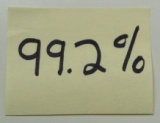
Hepatitis C is curable. When hepatitis C is undetectable in the blood for six or more months after treatment ends, we say that person had a sustained virological response to treatment or SVR. Early studies repeatedly found that 95 to 100% of the time, hepatitis C does not return once there is an SVR. Using more sensitive tests, a study by Mark Swain and colleagues, and one by Sarah Maylin and colleagues, showed even better results with long-term SVRs in the 99.2 to 100% range.
Although these numbers are cause for celebration, I sure wish once I reached my SVR, it was 100% certain that hepatitis C was gone. That minuscule eight-tenths or less of a percent is a tiny irritant. I feel nearly certain that hepatitis C is gone for good--in fact, I feel 99.2% certain.
By not accepting the certainty of the SVR results, I am cheating myself of experiencing the absolute freedom that an SVR result brings. It really comes down to one question: Albeit rare, why does hepatitis C return after an SVR?
Unlike HIV, hepatitis C does not form a latent reservoir, so technically if hepatitis C is nondetectable, it should remain that way. One theory as to why it may act otherwise, is that hepatitis C hides out in the lymphatic system. However, a study by Formann and colleagues found that although hepatitis C might be present in certain cells of someone with an SVR, there is no evidence that hepatitis C infection will recur.
Most of us have heard a story or two of someone who had an SVR, but hepatitis C returned. The likely explanations for this are lab mistakes and reinfection. However, viral load assays are much more sensitive now, so I rarely hear about anyone with an SVR later becoming viremic.
Departing from SVR for moment, I want to mention an interesting case study of a patient with cryoglobulinemia who was non-detectable for hepatitis C. Cryoglobulinemia is a disease in which proteins in the blood clump together and can damage blood vessels. There is a slightly higher prevalence of cryoglobulinemia in hepatitis C patients. The perceptive physician in this case study, Dr. Jonathan Kay at UMass Memorial Medical Center, knew that cryoglobulinemia causes false negative hepatitis C viral load results. The patient was treated for hepatitis C despite being nondetectable for the virus.
Although this case study wasn’t about a patient with an SVR, it does lead me to wonder about the relationship between immune factors and viral load testing. It certainly begs more thought and research. In the meantime, this month I will have my one-year viral load follow-up. I am 99.2% certain that hepatitis C will be non-detectable. In fact, I’d be shocked if the results were anything other than that. Perhaps I am beginning to accept that I am free from hepatitis C.







18 Comments
18 Comments